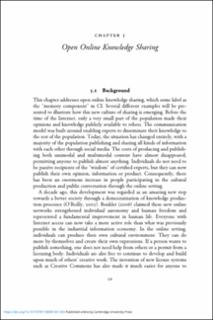| dc.contributor.author | Baltzersen, Rolf Kristian | |
| dc.date.accessioned | 2022-09-25T22:01:22Z | |
| dc.date.available | 2022-09-25T22:01:22Z | |
| dc.date.issued | 2022 | |
| dc.identifier.uri | https://hdl.handle.net/11250/3021109 | |
| dc.description | Chapter 3 in Cultural-historical perspectives on collective intelligence
In the era of digital communication, collective problem solving is increasingly important. Large groups can now resolve issues together in completely different ways, which has transformed the arts, sciences, business, education, technology, and medicine. Collective intelligence is something we share with animals and is different from machine learning and artificial intelligence. To design and utilize human collective intelligence, we must understand how its problem-solving mechanisms work. From democracy in ancient Athens, through the invention of the printing press, to COVID-19, this book analyzes how humans developed the ability to find solutions together. This wide-ranging, thought-provoking book is a game-changer for those working strategically with collective problem solving within organizations and using a variety of innovative methods. It sheds light on how humans work effectively alongside machines to confront challenges that are more urgent than what humanity has faced before. This title is also available as Open Access on Cambridge Core. | en_US |
| dc.description.abstract | Chapter 3 addresses open online knowledge sharing. Open sharing is becoming more important in all major sectors in society, including science, politics, education and innovation, knowledge products (videos, textbooks and databases). This sharing includes both the domain of expert-produced scientific knowledge and massive amounts of citizen-produced practical knowledge. Because of lower publishing costs, Open Access has become the new dominant trend that makes research accessible to everyone. Increased production of open textbooks gives a more readable access to scientific knowledge and reaches a much wider audience. In addition, scientific knowledge construction processes are becoming transparent. This includes the establishment of many more open digital databases that allow anyone both to make their own contributions and get free access to all the data (e.g. citizen science project like eBird). There is also experimentation with making knowledge construction processes more open, both within scientific discourse (e.g. Polymath project) and the development of encyclopedic knowledge (e.g. Wikipedia). In addition, the recent decade has seen an enormous increase in amateur-produced practical knowledge, not only texts, but an abundance of images and videos. Enthusiasts share their skills and passions concerning any activity that might be of interest to other like-minded persons. It also includes the sharing of political opinions, for example with new digital technologies like argument mapping. Even some companies in the business sector have begun sharing more of its corporate knowledge. | en_US |
| dc.language.iso | eng | en_US |
| dc.publisher | Cambridge University Press | en_US |
| dc.rights | Attribution-NonCommercial-NoDerivatives 4.0 Internasjonal | * |
| dc.rights.uri | http://creativecommons.org/licenses/by-nc-nd/4.0/deed.no | * |
| dc.subject | Knowledge construction processes | en_US |
| dc.subject | Knowledge products | en_US |
| dc.subject | Scientific knowledge | en_US |
| dc.subject | Practical knowledge | en_US |
| dc.subject | Open Access | en_US |
| dc.subject | Open Databases | en_US |
| dc.subject | Open textbooks | en_US |
| dc.subject | Wikipedia | en_US |
| dc.subject | Polymath | en_US |
| dc.subject | Video sharing | en_US |
| dc.subject | YouTube | en_US |
| dc.subject | Open geographical resources | en_US |
| dc.subject | Open innovation | en_US |
| dc.subject | Corporate knowledge | en_US |
| dc.subject | Argument mapping | en_US |
| dc.subject | Online deliberation | en_US |
| dc.subject | Transparency | en_US |
| dc.subject | Amateur knowledge | en_US |
| dc.title | Open Online Knowledge Sharing | en_US |
| dc.type | Chapter | en_US |
| dc.description.version | publishedVersion | en_US |
| dc.rights.holder | Rolf K. Baltzersen | en_US |
| dc.source.pagenumber | pp 50-74 | en_US |
| dc.identifier.doi | 10.1017/9781108981361.003 | |

